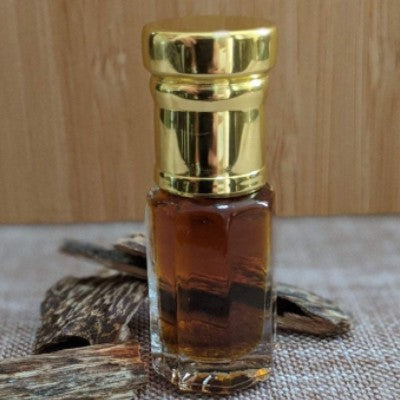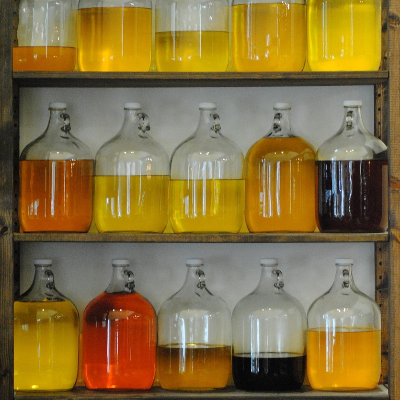Menu
-
-
F.A.Q
- How to identify genuine agarwood chip, natural or cultivated
- How to identify oil injection / absorption fake agarwood beads
- How to know if there are more than one oil in your oil
- How to make your wood bracelet or mala darker
- How to tell if an Agarwood bead sinks WITHOUT sinking it under water?
- How does back flow incense work and how do you burn it?
- Where to start if you don't know what agarwood is ?
- Why are you losing money if you buy seeds and plants?
- Which agarwood incense should I choose?
- Frequently Asked Questions
- Agarwood Related Articles
- Shipping
-
SHOP - Agarwood
-
SHOP - Other Fragrant Wood
-
SHOP - Incense Holder and Burner
-
- FREE Oud Oil guide
- Testimonials
- "Why did you buy this?"
- Contact us
- About Us
- +61430284329
- Login
-
English


A beginner's guide to Agarwood Oil - where should you start ,which one should you choose, and how do you choose it?
November 21, 2020 11 min read
Table of Contents:[hide]
You may heard of Oud oil, Agarwood oil from some forums, groups or friends. On many niche perfume, you also saw the word Oud on the label. Some people love it, many does not like it. So today, I will show you a bit about Agarwood Oil.
What is Agarwood oil
Agarwood oil is the oil that made from Agarwood.
Agarwood is harvested from infected Aquilaria trees.
Aquilaria trees are grown in many places. One of that many places is our plantation in Binh Phuoc Dong Xoai Vietnam.
Welcome to our plantation


Below is a 15 year-old Aquilaria Crassna tree



There are two main colour of this wood log: white and brown. White is healthy wood and brown is agarwood.
We cut these wood logs down further and grind them into small pieces, like the below

Agarwood essential oil
This is the old-school way and it is still the most popular way to get agarwood oil.


Here is the summary of how agarwood essential oil is distilled
Steam Distillation for Agarwood Essential Oils: Definition and Explanation
Steam distillation is a method used to extract essential oils from agarwood. This technique is particularly useful for agarwood because it allows for the extraction of its valuable oils at temperatures lower than their boiling points, preserving the quality and aroma of the oils.
How It Works
- Preparation: Pulverised agarwood is placed in a distillation chamber.
- Steam Generation: Water is heated in a separate container to generate steam.
- Steam Introduction: The steam is then introduced into the distillation chamber containing the pulverised agarwood.
- Volatilisation: The heat from the steam causes the agarwood essential oils to evaporate, turning into a gas.
- Condensation: The steam and evaporated oils are directed into a condenser, where they are cooled and turned back into a liquid.
- Collection: The condensed liquid, which now contains the agarwood essential oil and water, is collected. Since oil and water do not mix, the oil can be separated from the water.
Key Points
- Separation: The agarwood essential oils are separated from the water after condensation.
- Common Uses: This method is widely used in the perfume, aromatherapy, and traditional medicine industries to obtain pure agarwood essential oils.
Supercritical CO2 extracted Agarwood oil
Please note, Agarwood oil produced by this method is not classified as essential oil. Many people called it CO2 extracted Oil.
Supercritical fluid CO₂ extraction is a method used to extract essential oils from agarwood using carbon dioxide (CO₂) in its supercritical state. A supercritical fluid has properties of both a liquid and a gas, allowing it to penetrate materials like a gas but dissolve substances like a liquid. This method is highly efficient and produces high-quality agarwood oil.
How It Works
- Preparation: Pulverised agarwood is placed in an extraction vessel.
- CO₂ Compression: Carbon dioxide is compressed and heated until it reaches a supercritical state, where it behaves like both a liquid and a gas.
- Extraction: The supercritical CO₂ is passed through the extraction vessel containing the pulverised agarwood. The CO₂ dissolves the essential oils from the agarwood.
- Separation: The mixture of CO₂ and dissolved oils is then passed into a separator. By adjusting the temperature and pressure, the CO₂ returns to a gaseous state and separates from the oil.
- Collection: The separated agarwood essential oil is collected from the separator. The CO₂ is recycled back into the system for reuse.
Key Points
- Efficiency: This method allows for the extraction of a larger range of compounds compared to traditional methods.
- Quality: Supercritical CO₂ extraction preserves the integrity and aroma of the essential oils, producing a pure and high-quality product.
- Eco-Friendly: CO₂ is non-toxic and can be recycled within the system, making this method environmentally friendly.

Now you know what Agarwood oil is, what is next?
From the brief information above, you know what Agarwood oil is. You now wonder how it smell like?
If you had good experiences of trying Oud (or Agarwood) oil before, then congratulations on the experience.
If you had unpleasant experiences of trying Oud oil, and wonder why, then I will explain it. You will know what to do for a better experience next time. Sound fair?
Agarwood oil has many uses. People mainly use it for scent appreciation so I will discuss about the odour of it. To begin, we can talk about skunk's odour.
Skunk’s smell and the reason you don’t like it
Skunks are nocturnal animals and they tend to avoid animals and pets.

However, if a skunk encountered a dog, it might do a “handstand” to warn that dog. If the dog charged, it would spray an odorous yellow liquid that scare him away. If this liquid hit the dog, the dog would never forget and possibly avoid skunk at all cost (Source: Animalogic)
People describe this odorous smell like “rotten egg”, musky acrid scent.
One of the compound that caused the rotten egg smell is called “hydrogen sulphide”.
Hydrogen sulphide is often associated with the decomposition of organic material. In other words, something is in it decomposing state, it will emit this smell.
When you smell this odour, your brain will tell your body something is not right. Something is rotten around. To your brain, it is a sign of danger. Your brain tells your body to avoid it.
If you are in a lift and smell this odour, you will look around and think “Who is pooping?” because “poop” also has Hydrogen sulfide。
Because of all the negative experience of this odour, you are less likely to enjoy it or any products associated with it. This will explain my next point
Why don’t you like barnyard Oud?
To distil Oud oil, a distiller needs to submerge pulverised agarwood wood for a period of time. This period can be between 3 days to 1 month or even longer.
With barnyard Oud, the submersion period will usually be around 1 month.
If you submerged pulverised wood underwater for a month, the wood would start to decompose by many microorganisms in the water.
When the wood decomposes, it will produce hydrogen sulphide and many other odour molecules. When you breathe in these odorous molecules , your nerves tell your brain that you are smelling decomposing stuff. It tells your brain you are not safe.
You feel disgusted as a result.
How can we turn this smell around?
Barnyard Oud oil is the Oud oil that has this rotten note.
The smell of rotten wood may turn you off because you perceive this scent as a danger, your subconscious brain tells you this is not safe. You see this oil as dirty, yucky, unhygienic so you don’t like the experience of it
However, have you wondered if there are some pungent smells, even rotten, but people have to pay for it, queue up to smell it?
In the article - "People sometimes like stinky things", Engelhaupt (2015) sum it up: "safe threat".
Yes, the threat need to be safe to do it.
The Corpse flower which smells like corpse, mimics the stench of dead, rotting animals. The scent attracts pollinators like flies and beetles that lay their eggs on carcasses.
So we know it is safe to "enjoy" the smell so we are paying to smell it. That is why people line up in San Francisco and Adelaide for the experience.
In Indonesia, Malaysia, Thailand and Vietnam, there are several things in common. The first common: all of these countries have excellent Agarwood. And secondly, all of these countries also have the smelliest fruit: Durian.
Many people said durian is smelly and some even said it smells like poop. But some people also called it "The King of Fruit".
Good quality "smelly" durian usually has an average price of $27 AUD per kg. A durian typically weighs around 3 kg or $81AUD for each Durian.
People love these stinky aromas because they have a positive experience with them. And most importantly, it is safe to enjoy them.
Oud oil is no exception. Many people love "stinky" oud oil because it reminds them of a happy time. And they know it is safe to use these oil.
Is "decomposed" oud oil safe
"Decomposed oud oil" is distilled from decomposed oud wood. When wood is decomposed, it has many bacteria. Some are harmful, others are not.
The good news is that when these “decomposed” oud wood in the distilling chamber, and turn on the heat, the temperature will be 100 degrees Celsius for many hours. For this reason, most microorganisms will die.
Are there any toxins produced when wood is decomposed?
I am not a scientist or a chemist so I cannot confirm but I have not heard or seen any toxic cases related to barnyard Oud oil.
If I tell you there is a different method to make “aromatic” barnyard oil that you may like, would you be interested in finding out more?
First, let me show you "decomposition" for 'faecal grade' Oud
Warning: Graphic
When distiller grind agarwood to prepare for oud oil distillation, they submerge the wood chips under water. This process is to make the wood softer and to break them down bit to release its resin.
Unskilled distiller will left the wood to rot. They don't control the environment for agarwood distillation. I will show you one image

In these plastic barrel, some of the distillers do not cover them. What happened if insects lay eggs inside these barrels?
That is right, your oil will have extra protein from maggots and larvae.
If you happen to walk close to these barrels, you will feel a stench of death. Seriously.
Fermentation for good barnyard Oud.
On the other hand, Fermented wood is wood that is fermented and there is a difference.


In the fermentation process, distillers limit oxygen by compressing the pulverised wood in a barrel and close the lid. Without oxygen, many microbes (bacteria) die. They even add some “yeast” to increase the “flavour” of the wood. The odour you smell is far different to the decomposed one.
In the decomposition process, putrefactive bacteria grow and “eat” away the good stuff in the distilling materials: agarwood wood. Because of this, you only notice “rotten” smell. In short, the wood is spoiled
In the fermentation process, the wood may have also have some “rotten” smell, but it is not rotten. Oud oil distilled from fermented agarwood will have a unique smell.
If you apply a small dab, in the first instance, you will find some pungent smell, but between 30 minutes and one hour, you will find a scent of sweet, vanillic woody oudy appeared. You notice this smell because the wood is fermented, not spoiled.
Rarely anyone would like decomposed Oud,
but many would love fermented Oud.
But what if you don’t like fermented Oud oil at all?
I understand, if you don’t like it, no worry, because there are still many Oud oils that you can enjoy. These Oud oils are “clean” and free of any barnyard, decomposed or fermented notes. After all, not all of us like fermented food even though it is safe to consume.
Let me introduce
Supercritical CO2 extraction Oud Oil
This type of oil does not require “soaking” pulverised agarwood, and without soaking, there will be no decomposition, no fermentation, no pungent flavour that you don’t like.
With resinous agarwood, there is no need to soak because this method uses
CO2 as an odourless solvent, extracting all the good juices from agarwood. The result is clean, very wood Oud oil.
If you want to find out more about these Oud, we have the “Heaven Smoke” and Zen Path for you to try
What can you expect?
CO2 extracted Oud oil: you will find it is woody and smooth. There are no harsh or pungent notes. There is no change in scent. You will experience woody notes all the way until it starts to fade. In short, the scent of Supercritical Co2 extracted Agarwood Oil is very consistent.
Steam-distilled or hydro-distilled Oud oil
These oils are classified as agarwood essential oils (Supercritical Co2 extracted Oud oil is not called essential oil)
Generally steam-distilled Agarwood oil takes longer time, less yield but if done correctly, the scent profile is smoother with more complexity. If done incorrectly, the distiller may not get any oil at all.
What can you expect
Agarwood essential oils are more volatile than CO2 extracted oil. When you first dab it on your skin, it may be slightly pungent but after three to five minutes, these pungent notes vanish. Next you may find dried grass, herbaceous, floral, nutty fruity, peppery, and many more different notes. All of these notes will be dried down to woody eventually.
You may experience some up and down here.
At first you may not like these scents, but if you give these oils some time to reveal themselves, you will appreciate them.
In case you want to know more, you can visit our cultivated Agarwood Oil collection
So, now that you have learnt agarwood oil is produced. Which type of Oud oils would you like to try?
click here for Oud oil collection
The Characteristics of Oud
Oud has a uniquely powerful and mysterious scent, combining an earthy and musky aroma with dark, sensual, and animalic notes. The complexity of its fragrance profile can vary depending on the distillation process, the age of the heartwood, and the species of the Aquilaria tree used. Typically, oud oil presents a deep and alluring scent, with heart notes of rich resin and musky undertones, while the top notes may include light, woody hints. In its base note, oud exudes warmth, blending with other luxurious scents like sandalwood, saffron, patchouli, violet, rose, and jasmine.
Oud's unique fragrance is cherished not only in the Middle East but also in China ,India, Indonesia, Maylausia, Singapore Japan, Thai, and Vietnam where it has been used in incense, perfumes, and traditional medicine. The wood of the Aquilaria tree, known as agarwood, is highly prized for its fragrant resin, which makes it a crucial component in the creation of oud oil.
The Role of Oud in Modern Perfumery
In recent decades, oud has become a cornerstone in the world of high-end perfumery, celebrated for its exotic and sensual allure. The fragrance industry has embraced the richness and depth of oud, incorporating it into blends that reflect both traditional roots and modern creativity. Major perfume houses have launched oud-based scents, combining it with other natural sources like sandalwood, myrrh, bergamot, and musk to create perfumes that evoke both warmth and sensuality.
The heartwood of the Aquilaria tree is distilled into oud essential oil, which forms the base of these sophisticated fragrances. This oil has a long-lasting and powerful aroma, which is why it is often used as a base note in many luxury perfumes. Oud’s distinctive character allows it to blend seamlessly with a range of other scents, from fresh and light top notes to darker, more intense heart notes.
The Cultural Significance and Global Appeal
Oud’s popularity has transcended its historical and cultural origins, becoming an essential element in the international trade of fragrances. Known for its rarity and the intricate distillation process required to extract its oil, oud is often compared to “liquid gold” due to its high cost and limited availability. The cultivation and trade of agarwood chips and oud oil have become significant, reflecting the global appreciation for this extraordinary material.
Despite its ancient roots, oud continues to find new admirers in the world of luxury fragrances. Its appeal lies not only in its unique smell but also in the sense of mystery and sensuality that it conveys. The allure of oud is undeniable; it represents a blend of history, tradition, and modern elegance, capturing the imagination of those who seek an unforgettable and distinctive scent.
Leave a comment
Comments will be approved before showing up.


